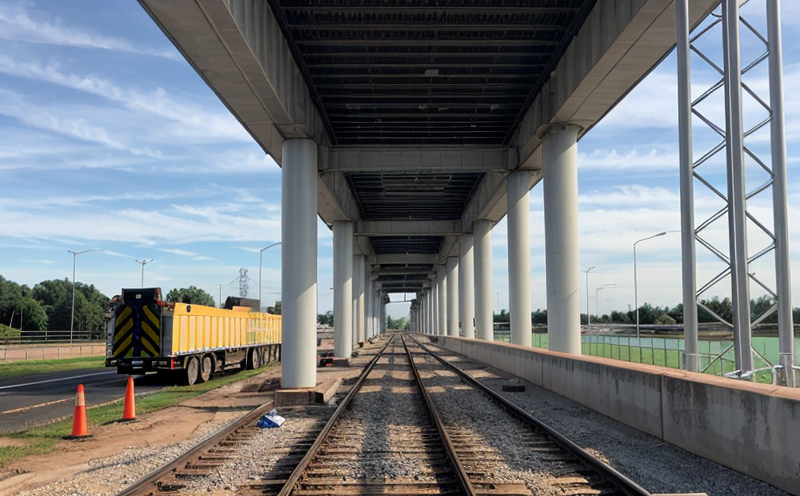ASTM C1609 Flexural Toughness of Fiber Reinforced Concrete
The ASTM C1609 standard provides a method for determining the flexural toughness of fiber-reinforced concrete (FRC). This test is particularly useful in assessing the structural integrity and performance of FRC under bending stress, which is crucial for infrastructure projects such as bridges, buildings, and pavements. Flexural toughness is an important property that indicates how resistant the material is to cracking when subjected to flexure.
The standard specifies a methodology involving loading a beam specimen until failure using a four-point bending test setup. The specimen is typically reinforced with polyvinyl alcohol fibers (PVA) or other compatible types of fibers, which are randomly distributed throughout the concrete matrix. The test measures both the load at failure and the strain up to that point, providing valuable insights into the material's toughness.
The methodology outlined in ASTM C1609 is designed to ensure consistent testing across different laboratories by specifying the dimensions and preparation of specimens, as well as the loading and testing procedures. This ensures repeatability and accuracy, which are essential for reliable data that can be used for quality assurance and compliance purposes.
The test parameters include:
- Specimen dimensions: Typically 150 mm x 75 mm x 75 mm (L × W × H).
- Loading rate: Usually between 0.2 MPa/s and 0.3 MPa/s.
- Environmental conditions: Specimens must be cured under controlled humidity and temperature to avoid premature cracking or failure due to environmental factors.
The primary focus of this test is the flexural behavior of concrete reinforced with fibers, which are known for their ability to enhance toughness by distributing stress more evenly across the material. This makes them particularly valuable in high-stress environments where traditional steel reinforcement may not be sufficient.
Understanding the flexural toughness of FRC is crucial for infrastructure projects because it helps engineers design structures that can withstand extreme conditions without cracking or failing. For instance, bridges exposed to heavy traffic and environmental stresses benefit greatly from materials with improved flexural toughness.
The ASTM C1609 method ensures consistent evaluation of this property across different laboratories, which is critical for standardization in the industry. This consistency allows for accurate comparisons between samples and helps in identifying trends or anomalies that may arise during production processes. Furthermore, compliance with this standard is essential for projects requiring certification to specific international standards.
By using ASTM C1609, labs can provide reliable data on flexural toughness, which can be used to optimize the design of concrete structures and ensure they meet necessary safety and durability requirements.
Eurolab Advantages
At Eurolab, we offer a comprehensive suite of services that cater specifically to ASTM C1609 testing. Our dedicated infrastructure testing laboratory ensures that every test is conducted under the strictest quality control measures, adhering rigorously to the ASTM standards.
The advantages of using our laboratory for ASTM C1609 flexural toughness testing include:
- Accurate and Consistent Results: Our state-of-the-art equipment and experienced technicians ensure that each test is conducted with precision, leading to reliable results.
- Compliance Assurance: Eurolab’s thorough adherence to ASTM C1609 guarantees compliance with international standards, ensuring that your tests meet all necessary requirements.
- Expertise and Experience: Our team of experts brings a wealth of knowledge and experience in conducting such tests, providing accurate interpretations and insights into the test results.
- Customized Solutions: We offer flexible solutions tailored to meet your specific testing needs, whether you require routine testing or one-off evaluations.
- Timely Delivery: Our efficient processes ensure that you receive your test reports promptly, allowing for timely decision-making and project progress.
- Supportive Documentation: We provide detailed documentation and reports that are easily understandable, making it easier to interpret the results and act on them.
The combination of our advanced facilities, experienced staff, and commitment to quality makes Eurolab an ideal choice for ASTM C1609 testing. Our clients benefit from a seamless testing experience, ensuring they receive accurate and reliable data that can be trusted.
Customer Impact and Satisfaction
Eurolab’s services have significantly impacted our customers by providing them with high-quality infrastructure testing solutions. By leveraging ASTM C1609 flexural toughness tests, we enable our clients to:
- Enhance Structural Integrity: Our tests help in identifying the optimal fiber content and type for concrete reinforcement, ensuring that structures are built to last.
- Ensure Compliance with Standards: By adhering strictly to ASTM C1609 standards, we ensure compliance with international regulations, thereby reducing legal risks.
- Optimize Design: The detailed reports provided by our tests help engineers refine their designs, making them more efficient and cost-effective.
- Promote Safety: With accurate testing results, structures are built to withstand various environmental stresses, enhancing safety for occupants and passersby.
- Foster Innovation: Our expertise in ASTM C1609 encourages the development of new materials and techniques that improve structural performance.
We pride ourselves on delivering not just accurate test results but also a supportive service that helps our clients make informed decisions. Customer satisfaction is at the core of what we do, ensuring that every project receives the highest level of attention and care.
International Acceptance and Recognition
The ASTM C1609 standard for flexural toughness testing of fiber-reinforced concrete has gained widespread acceptance and recognition globally. This standard is widely used in industries that require rigorous quality assurance and compliance, particularly in the construction sector.
Recognized by major organizations such as ISO (International Organization for Standardization) and EN (European Norms), ASTM C1609 ensures consistency and reliability across different regions. This global recognition underscores its importance in ensuring high-quality infrastructure projects worldwide.
By adhering to ASTM C1609, labs like Eurolab contribute significantly to the international standards movement, helping to set benchmarks for excellence in testing and quality assurance. The acceptance of this standard reflects a commitment to delivering consistent results that are trusted by industries across the globe.





